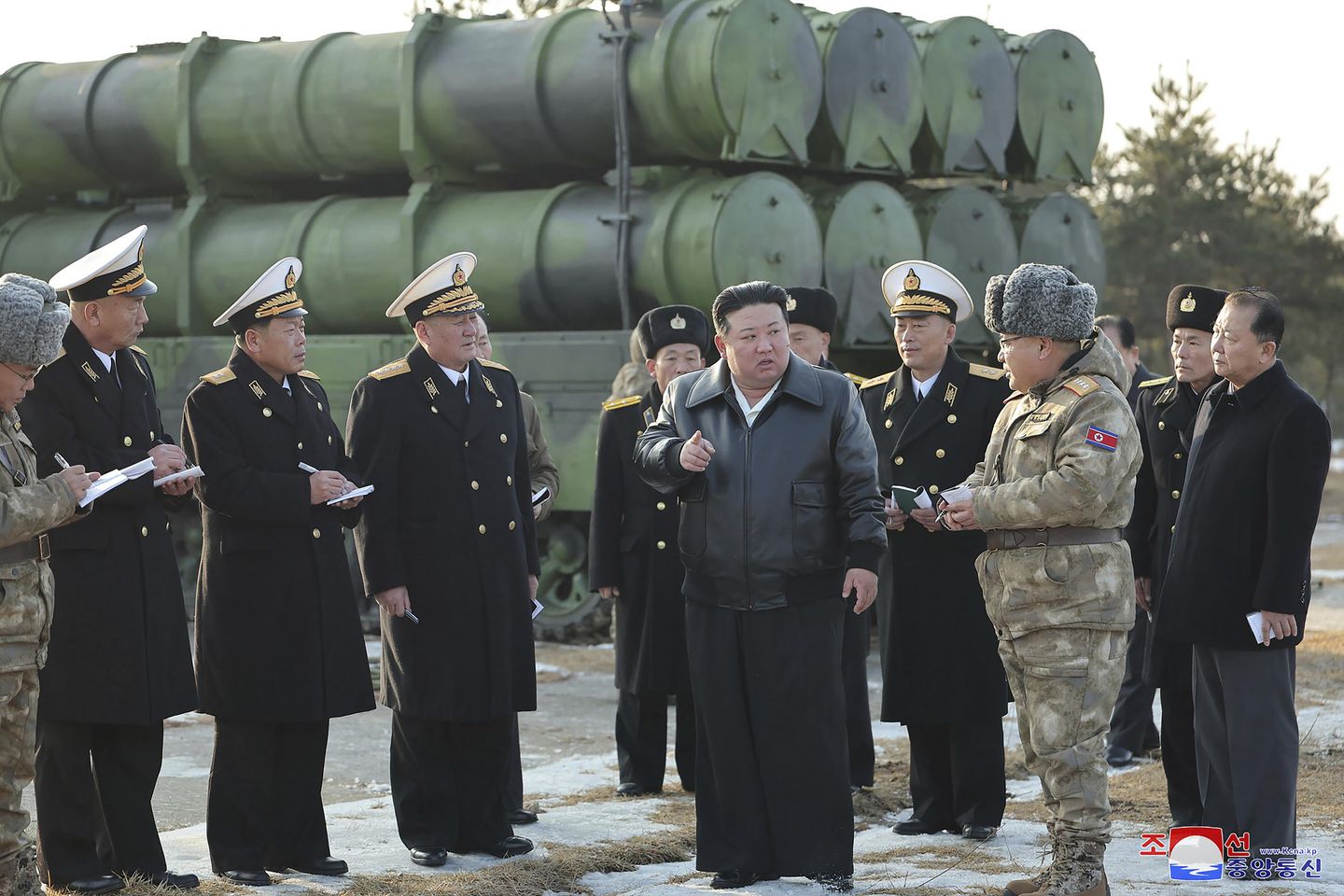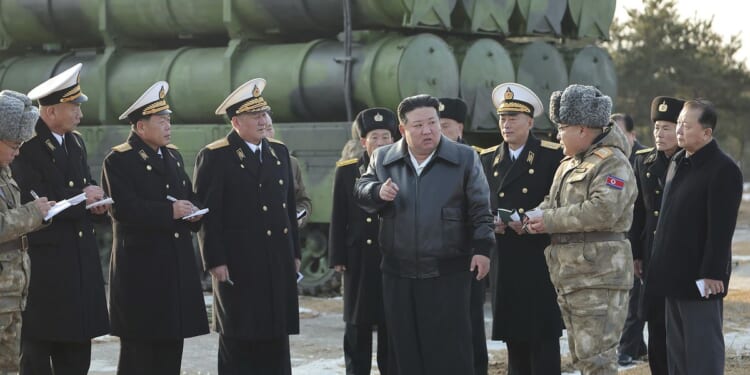
SEOUL, South Korea – It’s a paradox.
North Korean leader Kim Jong-un’s unchallenged leadership at home makes him strategically unpredictable to the U.S. and its allies. But that same unquestioned grip on power makes Mr. Kim tactically vulnerable, due to systemic weaknesses built into his top-down chain of command.
That’s the view of one well-placed Pyongyang watcher who has advised U.S. commanders for decades on the North Korean threat and who spoke on background of the challenges facing the North Korean leader.
While Mr. Kim himself remains a puzzle to outsiders, the ability of North Korea’s military to strike U.S. assets Pacific-wide is becoming increasingly clear.
Pyongyang state media this week confirmed the test launch of a new intermediate-range ballistic missile, or IRBM. The missile, a solid-fuel Hwasong-16B, with hypersonic speed and maneuverability, splashed in the Sea of Japan.
Mr. Kim, who has made it a habit to be on hand personally when major new military assets are unveiled, monitored the launch as he had a previous hypersonic missile test in January.
North Korea’s state-controlled media claimed that the regime’s arsenal of “tactical, operational and strategic missiles with various ranges” are now solid-fueled and capable of delivering nuclear weapons. While questions still hang over the North’s guidance systems and the re-entry vehicles that bring warheads into Earth’s atmosphere, the force’s increasing sophistication presents mounting challenges for U.S. and South Korean defense planners.
IRBMs could feasibly strike U.S. bases and other installations supporting South Korea in Japan, Okinawa and Guam. Mr. Kim’s intercontinental ballistic missiles have already demonstrated the range needed to strike the U.S. mainland since 2017.
These new weapons offer new capabilities.
Solid-fuel missiles can be launched more quickly than liquid-fuel missiles, making them harder to preempt. Hypersonic weapons, which combine flight speeds of Mach 5 with unpredictable maneuverability, are harder to shoot down than previous-generation projectiles.
But while Mr. Kim’s unquestioned power makes the situation even more dangerous, the North Korean expert says the North faces inbuilt vulnerabilities that negate some of the weapons’ effectiveness, and raises questions for the regime of what would happen if their commander in chief was suddenly eliminated from the equation.
The ‘dictator’s dilemma’
“The weak point of not only our military and government officials, but also our media at large, is that they don’t really have an understanding of how ill-advised Kim is,” the analyst warned, basing his view in part on extensive interviews with former members of the Kim regime.
Mr. Kim’s inner councils could fail to prevent him from launching an unwise attack as members are predisposed to offer rosy views, not harsh realities, about the leader’s proposals, the expert said.
Mr. Kim governs via three key bodies: the Politburo, the Korean Workers Party Central Military Committee (CMC) and the ruling party’s Organization and Guidance Department (OGD).
The 27-member Politburo is essentially a cabinet, while the CMC, at about half that size, comprises leading party officials and senior military officers. The OGD controls personnel decisions in all major positions of the governing structure.
“You cannot succeed in these organizations unless you are a yes man,” the analyst noted. “If you are a yes man, you cannot tell the leader something he does not want to hear, and even worse, you are in competition with fellow committee members to remain in your position.”
Hence Mr. Kim does not “necessarily get the truth, or factual information.”
Periodic purges can end in execution – notably of Jang Song-thaek, Mr. Kim’s uncle, executed in 2013. But purges are not necessarily fatal.
The source cited Party Secretary for Defense Industries Ri Byong-chol, a senior cadre and member of both the Politburo and the CMC, as an example.
“He is sometimes gone for six months at a time — he obviously said the wrong things — but always comes back,” the source, who sees Mr. Ri as Mr. Kim’s “best informed advisor,” said. “Nobody knows issues better than him: He knows the destructive power of the U.S., and would probably tell the truth to Kim.”
Commissars and control
Unpredictability can be a useful asset in international relations, but it creates vulnerabilities, too – notably its cumbersome command and control protocols.
All military assignments come from the CMC rather than the military hierarchy, the source said. Military officers down to company level are overseen by a political officer, or commissar. Officers can question assignments and policies, but cannot use their initiative without their commissar’s agreement.
Beyond the commissar, more control is added by a security officer, who ensures military units do not target Pyongyang.
This politicized chain of command likely undercuts the accelerated speed-to-launch timings of the North’s new solid-fuel weapons.
“Anyone who thinks this will not be an issue for the North Korean nuclear launch system does not know how North Korea works,” the source said. “Communications between Kim and a missile unit go through three channels: commissar, military officer and security officer. All have to match.”
If tensions rise to the point where forces are actively redeploying on and around the peninsula, North Korean signals traffic would increase much more than for a military controlled via a more streamlined chain of command.
“The more serious the crisis, [U.S.] actions of intercepting communications expand exponentially,” the source explained. “What we pick up is going to indicate what actions we have to take.”
Washington stations three Ohio-class ballistic missile submarines in the Indo-Pacific region able to strike the North. South Korea, too, has a “Kill Chain” system designed to eliminate North Korea’s leadership in a serious crisis.
Both governments have repeatedly warned Pyongyang that war would end the Kim regime.
One hedge against a potential decapitation strike or other loss of the political command is decentralization of launch authority, via automated protocols or delegation.
‘Dead hand’ vs. dead response
Even if a state’s leaders were taken out, the theory went, the attacker would still face a devastating retaliatory strike. The Cold War-era Soviet system has been informally dubbed a “dead hand” capability.
In September 2022, Pyongyang promulgated a new law for its nuclear weapons. It reiterated Mr. Kim’s sole authority to launch nuclear weapons, but for the first time noted that “a nuclear strike shall be launched automatically and immediately” according to an “operation plan decided in advance” if the leader’s control “is placed in danger owing to an attack by hostile forces.”
It is unclear how this would work, whether through an automated or even artificial intelligence protocol or through some pre-planned delegation of launch authority to individual missile units farther down the chain of command. But close watchers of North Korea say they are doubtful such a “dead hand” approach could operate in a regime as centralized — and paranoid — as Mr. Kim’s.
“We see how North Korea works, structurally, and how decisions are very difficult to take without the signature of the leader. If the leader is dead, who is to say, ‘Do this?’” asked Chris Green, a senior consultant on the Koreas with the International Crisis Group think tank. “It’s a structural flaw, … a security vulnerability built into the system.”
Andrei Lankov, an expert on North Korea at Seoul’s Kookmin University, agreed.
“Kim should have a back-up option, and he informed the world of that,” Mr. Lankov said. “But that’s not enough: He should do something to demonstrate the system, if it exists. Otherwise it would be tempting to have him and his family killed and — problem solved.”
Mr. Lankov, however, said he did not share the source’s view of Mr. Kim’s limited access to accurate information. He cited Mr. Kim’s Swiss education as a young man and his direct contacts with the leaders of China, South Korea, Russia and the U.S. since taking power from his father in 2011.
“He is determined, remarkably well-educated and can read foreign languages — some English and some German, probably,” Mr. Lankov said. “He knows some things about the outside world, so personally, I am optimistic.”












